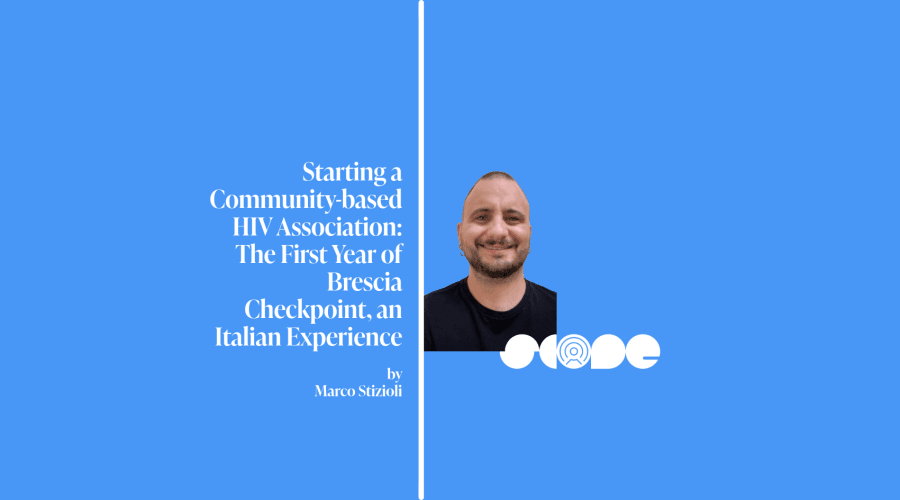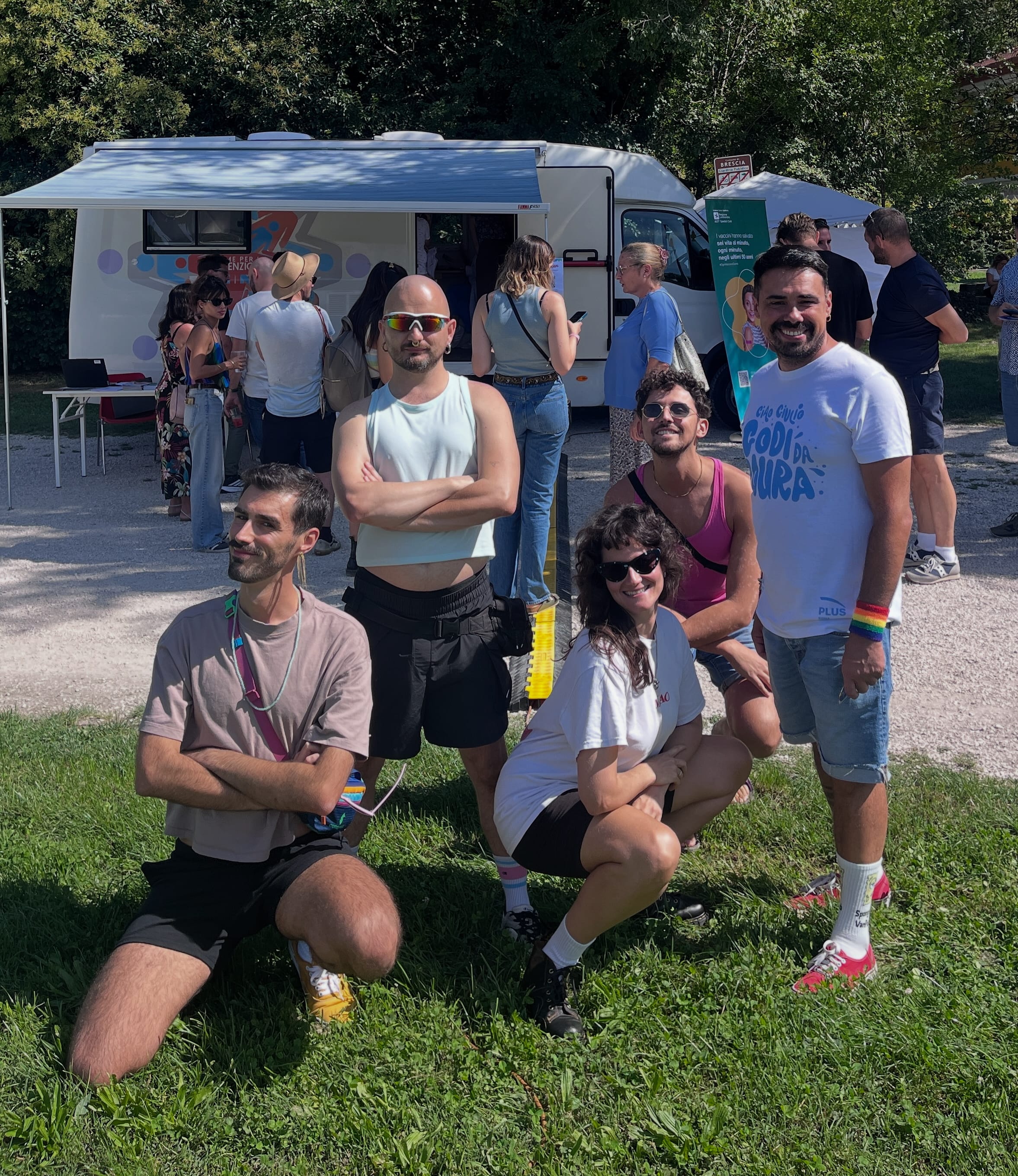
This October is the first anniversary since we officially launched Brescia Checkpoint, the first community-based organisation in my hometown, Brescia, in northern Italy. As president, I’ve had the privilege of watching our work grow from a simple idea into something tangible.
As part of the Community Expert Group of the SCOPE project, I’d like to share a few practical tips for starting a community-based HIV organization in your city. These aren’t “rules,” but lessons from the field. Some may seem obvious; others might give you the push you need – even if you live in a small town.
People have sex everywhere, and they have the right to take care of their own sexual health and get evidence-based information in a cozy environment.
1.Being a pro-on HIV and the gaps around you
If you want to start an organisation you need to be damn expert about HIV — not only because you’ll often find yourself discussing it with healthcare professionals, but above all to provide your community with accurate and in-depth information.
The HIV & Co-infections EATG newsletter is a great resource, but what really helped me was the 2022 SCOPE workshop, which I attended as a participant. That was a turning point in how I framed things.
But it’s not just about HIV in general; it’s about how HIV and public health policies play out in your local context. In Brescia, for example, every year we face one of the highest HIV diagnosis rates in Italy, and while the province is vast, services are concentrated only in the main city.
That alone explains why Brescia Checkpoint was founded.
2.Letting U=U lead the way
Every time someone gets tested or meets us in our outreach booth, it’s our mission to explain and remember that people living with HIV on treatment cannot transmit the virus, even through condomless sex.
Since in Italy we have the privilege of free universal access to HIV treatment*, U=U is the buona novella, the key to breaking stigma and freeing people from the fear of this infection.
As an organisation dedicated to HIV and sexual health, we considered it fundamental to establish a peer group for people living with HIV — the first in Brescia in decades. A place to break the silence and support each other.
*Extra-EU students and some categories of foreign workers are required to pay between €700 and €2,000 for a National Health System card in order to access treatment.
3.Finding volunteers, and trust them
Even though I am a control freak and sometimes act like Miranda Priestly from The Devil Wears Prada, I am perfectly aware that Brescia Checkpoint exists only because we have a strong group of loyal volunteers.
Finding the right people is not easy, but you have to take the leap, trust your instincts, and give them responsibility. Sometimes they’ll let you down, but it’s a risk worth taking — after all, we won’t reach the WHO 2030 goal by trying to carry all the weight of an NGO on our own.
 Brescia Checkpoint's team at the HPV vaccine corner at Brescia Pride
Brescia Checkpoint's team at the HPV vaccine corner at Brescia Pride
4.Being a paperwork nerd who likes money
I know it’s boring but filling out Excel files and drafting grant applications is activism, just like taking to the streets for demonstrations. If you have difficulties in bureaucracy, probably there are NGOs that can help you for free to navigate paperwork.
Every country has its own rules for nonprofit: in Italy, it is almost mandatory to be a registered organisation to receive funding from grants.
And we need money to buy HIV testing, print flyers, buy materials for our events, pay rent and bills if we have an office and, of course, our salaries.
Because being a 9-to-5 volunteer is only possible if you are privileged.
5.Networking at events and building alliances
I don’t like attending events and I don’t like talking with strangers either. But if I hadn’t gone to that networking event organized by the municipality, I wouldn’t have met the coordinator of a community center, with whom we later applied for a grant (we didn’t win, but that’s another story). So, force yourself to go out, send emails, and ask for appointments with local NGOs to set up new alliances.
6.Engaging with institutions (and embracing their pace)
Who runs the HIV clinics where people need linkage to care? Public health institutions, of course. That’s why collaborating with them isn’t optional — it’s a moral imperative. Only through them can our clients start effective treatment.
But it’s not just about treatment. You can also join forces to offer more services, like we did at Brescia Pride 2026, where local public health offers free HPV vaccines.
Yes, institutions move slowly — much slower than we do. Don’t get discouraged if progress takes months. Stay patient, stay persistent, and keep showing up at the table. From our experience, building trust is just as important as building services.
7.Starting small it’s better than not starting at all
If Rome wasn’t built in a day, imagine an HIV community-based organisation in a city that had never had one. At the moment Brescia Checkpoint doesn’t have a headquarters. It’s our dream to have our own space, but we don’t have the money. So, we provide HIV testing at outreach events or hosted by other organisations, generally once a month.
It’s not enough but it’s better than before. A year ago, in Brescia, there was no HIV testing service run by a community based organisation.
Sometimes we envy other local and European organizations: they do this, they do that, they have money, connections, and strong institutional support.
We are small, maybe a bit rough — but we’re here. And we’re not going anywhere..
Marco Bastian Stizioli
Brescia Checkpoint
SCOPE Community Expert Group Member (EATG)
Social Media
Instagram: @bastbuxx
X: @bastbux87
Linkedin: Marco Bastian Stizioli
Get involved
Are you living with HIV/AIDS? Are you part of a community affected by HIV/AIDS and co-infections? Do you work or volunteer in the field? Are you motivated by our cause and interested to support our work?
Subscribe
Stay in the loop and get all the important EATG updates in your inbox with the EATG newsletter. The HIV & co-infections bulletin is your source of handpicked news from the field arriving regularly to your inbox.

